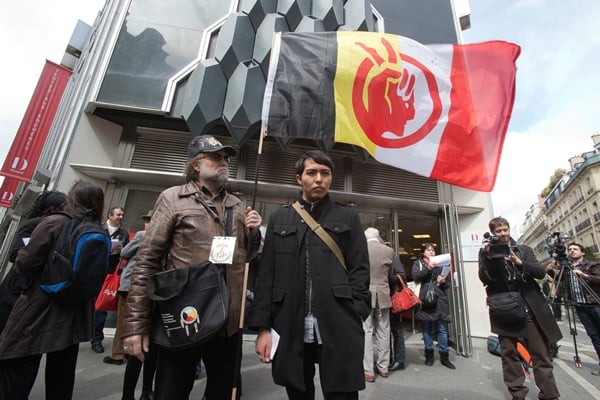
The Holocaust Art Restitution Project (HARP) and the Chairman of the Native American Hopi Tribe Council, Herman G. Honanie, have jointly announced that they will file a lawsuit in France in an attempt to stop the auction of a sacred Hopi “Kwaa Tsi” (mask), which is scheduled to take place at Paris’ Hotel Drouot on December 15.
In an email to artnet News, a representative for HARP explained that “This is in part to remind all of us that this issue is bigger than the Holocaust and than Nazis and Jews. Plunder and restitution are broad subjects about which we feel morally obligated to be vigilant, and to lend our assistance when it is desired and when we can be helpful, regardless of the specific mode of pillage or spoliation.”
The legal action has been filed before the French Conseil des Ventes (Board of Auction Sales), a regulatory organization that oversees French auctions. According to a press release, HARP and the Hopi Tribe argue that due to the sacred nature of the artifacts the ownership title never passed from the tribe to the consignor.
HARP Chairman Ori Z. Soltes emphasized that “The Conseil des Ventes has the power to suspend this sale on two grounds. First, the presumption of good faith of the seller, which is the legal rule in France to challenge these sales, is eradicated by the numerous regulations and statutes which have been in effect in the U.S. for years. Furthermore, the Conseil must seek the provenance information for these objects from the seller. These objects cannot be sold or disposed of for legal, cultural and moral reasons.”
A Hopi Katsinam that sold on June 27 at Pari-based auction house Eve.
Photo via Eve Paris
Pierre Ciric, an attorney representing HARP told artnet News, “The goal is not to seek the restitution of the objects but to suspend the sale.” According to Ciric the Hopi tribe has previously filed three unsuccessful civil lawsuits in French courts. On this occasion the tribe is hopeful that taking the case to the Conseil des Ventes will yield a more successful outcome (see “US Efforts Fail to Halt French Auction of Hopi Artifacts“).
A representative of the Hopi Tribe, Marilyn Fredericks, said “The outcome we would like is long term education of Hopi perspectives, and an understanding of our way of belief. Although it does not reflect the European type of belief and religions, we would like the world to respect us as Hopi people.” She added, “We call on the french government to do the right thing and listen to our petition that we have sent to the ministers of culture, foreign relations and justice.”